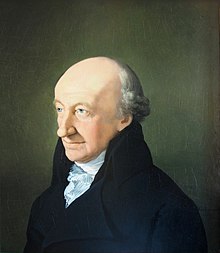
Back Christoph Martin Wieland ALS كريستوف مارتين فيلاند Arabic Крыстаф Марцін Віланд Byelorussian Кристоф Мартин Виланд Bulgarian Christoph Martin Wieland Breton Christoph Martin Wieland Catalan Christoph Martin Wieland Czech Christoph Martin Wieland Danish Christoph Martin Wieland German Κρίστοφ Μάρτιν Βίλαντ Greek

Christoph Martin Wieland (German: [ˈviːlant]; 5 September 1733 – 20 January 1813) was a German poet and writer, representative of literary Rococo. He is best-remembered for having written the first Bildungsroman (Geschichte des Agathon),[1] as well as the epic Oberon, which formed the basis for both Friederike Sophie Seyler's opera of the same name and Carl Maria von Weber's opera of the same name. His thought was representative of the cosmopolitanism of the German Enlightenment, exemplified in his remark: "Only a true cosmopolitan can be a good citizen."[2][3][4] He was a key figure of Weimar Classicism and a collaborator of Abel Seyler's theatre company.
- ^ Swales, Martin. The German Bildungsroman from Wieland to Hesse. Princeton: Princeton University Press, 1978. 38.
- ^ Rasmussen, Dennis C. (2014). The Pragmatic Enlightenment. Cambridge University Press. p. 12.
- ^ Carter, April (2013). The Political Theory of Global Citizenship. Routledge.
- ^ Wellbery, David E. (2004). A New History of German Literature. Harvard University Press. pp. 382–383. ISBN 9780674015036.